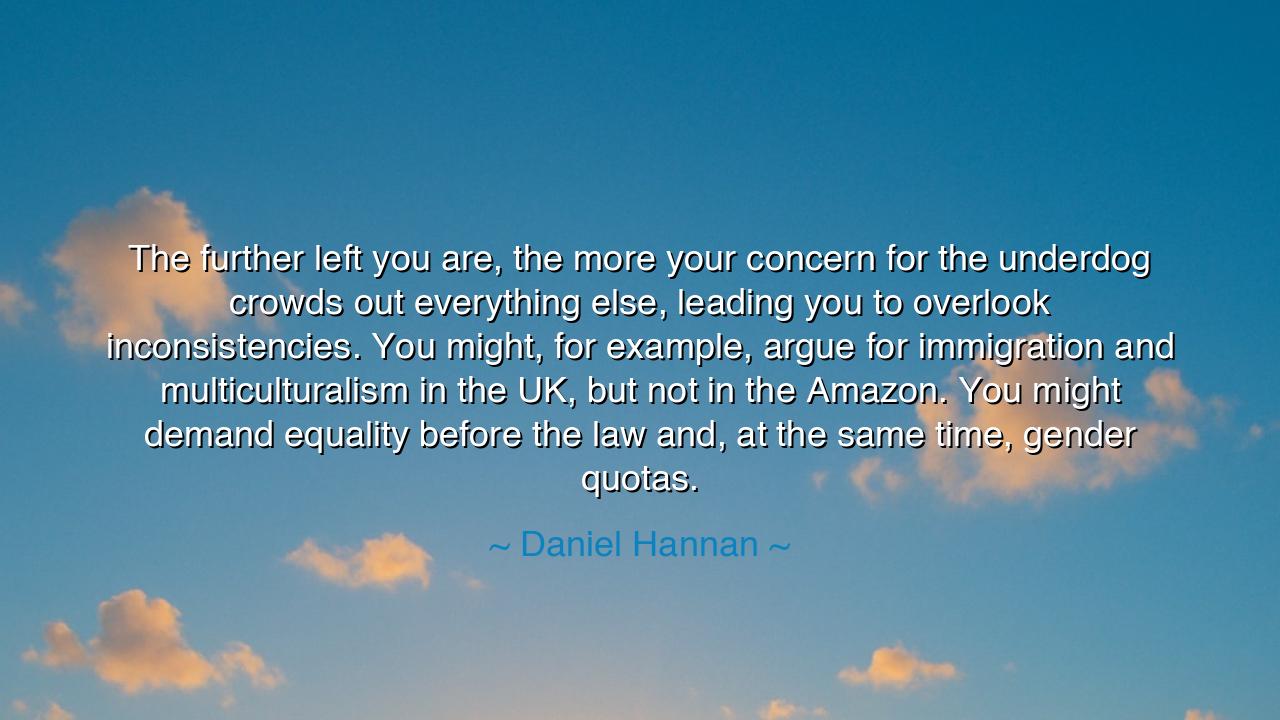
The further left you are, the more your concern for the underdog
The further left you are, the more your concern for the underdog crowds out everything else, leading you to overlook inconsistencies. You might, for example, argue for immigration and multiculturalism in the UK, but not in the Amazon. You might demand equality before the law and, at the same time, gender quotas.






Hear, O Children of the Future, for the words of Daniel Hannan carry with them the weight of reflection, a call to heed the deeper currents that move through our ideals and actions: "The further left you are, the more your concern for the underdog crowds out everything else, leading you to overlook inconsistencies. You might, for example, argue for immigration and multiculturalism in the UK, but not in the Amazon. You might demand equality before the law and, at the same time, gender quotas." These words speak to the tension between compassion and consistency, between the desire to protect the vulnerable and the need to maintain a coherent and just society.
Since the earliest days of human civilization, there have been those who have fought for the underdog, those who have stood for the oppressed, the marginalized, and the outcast. These voices have risen throughout history, from the slaves in ancient Egypt to the poor in the streets of Rome, from the laborers in the industrial revolution to the disenfranchised citizens of today. In every age, there has been a powerful pull to advocate for those who suffer, to raise their voices in their defense, for the underdog’s cause is the cause of justice. Yet, as Daniel Hannan points out, this noble pursuit can sometimes blind us to the inconsistencies that arise when we apply our principles unevenly.
Let us reflect upon the ancient wisdom of the Greeks, who believed that justice was the highest virtue, yet also understood that justice required balance. The great philosopher Aristotle wrote that true justice is the “treating of equals equally and unequals unequally.” This wisdom is key to understanding Hannan's message. When one’s concern for the underdog becomes so overwhelming that it disregards the need for balance, it can lead to contradictions. The desire to help the vulnerable, while virtuous, must be tempered with the understanding that justice, to be true, cannot be applied selectively or in a manner that creates inconsistencies.
Consider the example of ancient Rome, which at one point was a beacon of justice, where the law was meant to be applied equally to all citizens. But in its later days, the Romans often found themselves struggling with contradictions in their own society. They would defend the rights of citizens and speak of universal equality while simultaneously engaging in practices that undermined those very principles. In the great bread and circuses of Rome, there was a growing disconnect between the ideals of fairness and the actions of the state. The people, who once saw their leaders as protectors of equality, began to see the erosion of those principles. In focusing on the needs of one group at the expense of consistency, the Romans sowed the seeds of their own downfall.
Hannan’s observation about immigration and multiculturalism serves as a modern reflection of this ancient tension. It is a noble cause to want to embrace diversity, to protect the rights of those who are fleeing persecution, and to foster a society that values cultural exchange. But the inconsistency arises when such values are applied with different standards in different parts of the world. Why, Hannan asks, should one advocate for multiculturalism in one place while rejecting it in another? It is in this conflict of principles that we see the dangers of becoming so consumed by compassion for the underdog that we lose sight of the broader framework of justice and fairness.
Moreover, the call for equality before the law is a fundamental tenet of justice. But when we also advocate for gender quotas, we must ask ourselves whether we are compromising the principle of equality. Does a quota system create a more just society, or does it inadvertently divide people by their gender, offering preferential treatment that distorts the balance of justice? The question is not whether the cause is noble, but whether the means by which we seek it truly reflect our highest ideals of fairness and equality. In seeking to protect the rights of the vulnerable, do we risk creating a society where justice becomes selective and inconsistent?
The lesson for you, O Children of the Future, is this: Seek justice, but seek it with wisdom. Care for the underdog, but remember that true care is not about compassion alone—it is about balance, fairness, and consistency. Do not let your ideals blind you to contradictions, for in striving for fairness, you must apply your principles evenly across all areas of life. Understand that true justice requires wisdom—the wisdom to see that what is right for one situation may not be right for another, and the wisdom to know when compassion must be tempered by consistency.
In your actions and decisions, remember this: Do not allow your empathy for one to create injustice for another. Apply your principles with clarity and seek harmony in all that you do. May you live not in the clamor of contradictions but in the calm of wisdom, where justice and compassion walk hand in hand, creating a society where all are treated equally and fairly. In this way, your legacy will not be marked by inconsistency, but by a true commitment to the common good, a good that serves not one, but all.






AAdministratorAdministrator
Welcome, honored guests. Please leave a comment, we will respond soon